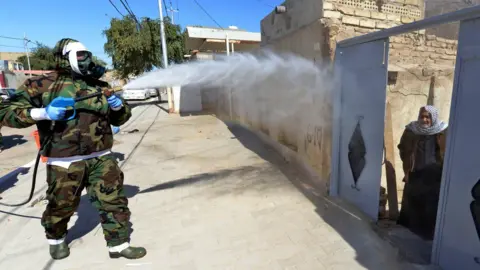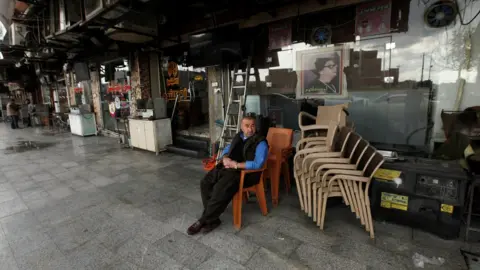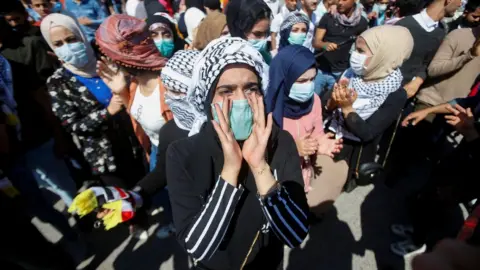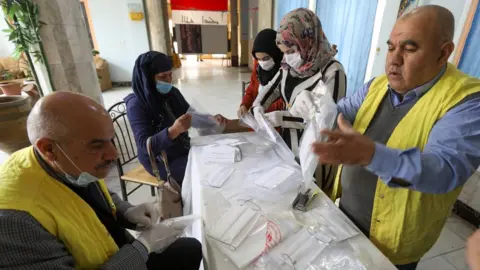Coronavirus: Iraq reports first two confirmed deaths as fears rise
 AFP
AFPIraq's health ministry has announced its first two confirmed deaths related to the new coronavirus disease.
A woman with a compromised immune system and a 65-year-old man who suffered from chronic diseases died on Wednesday in the capital, Baghdad.
There were also conflicting reports about a 70-year-old cleric who died in Sulaimaniya, in the Kurdistan Region.
Kurdish officials said the death was the result of Covid-19, but the health ministry said that was not confirmed.
Two relatives of the cleric, who was in quarantine before his death, have tested positive for the disease, according to the Kurdish health authorities.
 Reuters
ReutersIraq has so far reported 34 cases, according to the World Health Organization (WHO). Most of them are linked to neighbouring Iran, where an outbreak has killed 107 people and infected 3,513 others.
There is concern that Iraq's health system will not be able to cope with a major outbreak, after years of war, UN sanctions, neglect and corruption.
A member of the Iraqi parliament's health committee has said the country's "hospitals and healthcare facilities are fully equipped to deal with the outbreak".

What do I need to know about the coronavirus?
- LATEST: Live coverage of developments
- EASY STEPS: What can I do?
- A SIMPLE GUIDE: What are the symptoms?
- MAPS AND CHARTS: Visual guide to the outbreak
- VIDEO: The 20-second hand wash

But the WHO said last month that Iraq's medical infrastructure had "some significant gaps" that it was working to address. Doctors have reported shortages in supplies, equipment and staff.
There are also more than 4.1 million people, almost half of them children, in need of humanitarian assistance in Iraq.
Some 1.4 million civilians are internally displaced, and there are hundreds of thousands of refugees from neighbouring countries.
The UN has warned that many are living in camps where conditions and outdated infrastructure mean that Covid-19 could potentially spread easily.
 Reuters
ReutersIraq's border with Iran has been closed, and Iraqi citizens returning from Iran are required to undergo a 14-day mandatory quarantine.
In an attempt to halt the spread of the disease inside Iraq, the authorities have placed restrictions on gatherings at public sites and ordered the closures of schools, universities, cinemas and cafes. Several government ministries, departments and committees have also suspended work.
On Thursday, the Shia religious authorities announced that they had cancelled the weekly Friday prayers in the southern holy city of Karbala.
A statement issued by the Imam Hussein Shrine Administration on Thursday said the decision was taken in response to the "current health situation" and a call by Karbala's health department to "refrain from holding large gatherings these days".
 Reuters
ReutersThe shrines in Karbala and in the neighbouring city of Najaf - where an Iranian theology student was Iraq's first case of Covid-19 - attract millions of Shia pilgrims from across the world every year. The Iranian city in Qom, which is also a major Shia pilgrimage site, was where Iran's Covid-19 outbreak first emerged.
This month there are three significant Shia holy days that would normally attract large numbers of pilgrims from Iran.
Saudi Arabia said on Wednesday that it had suspended the lesser Muslim pilgrimage, or Umra, for citizens and residents as a precaution. Last week, it barred foreigners from performing pilgrimages to Mecca and Medina.
Cases linked to Iran have also been reported by Saudi Arabia, as well as Afghanistan, Canada, Lebanon, Pakistan, Kuwait, Bahrain, Oman, Qatar and the United Arab Emirates.
The UAE, which is a major hub for international air travel, told citizens and foreign residents on Thursday to "avoid travel" anywhere abroad.
